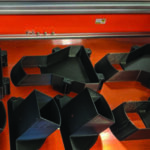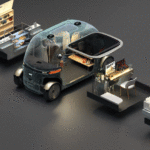Henkel, the globally operating adhesive and sealants conglomerate, has partnered with the SYMPA research project that seeks to develop SLA / DLP composites for 3D printing automotive parts; the partners will also research new printing and post-processing methods. The project is sponsored by the German Federal Ministry of Education and Research and the Federal Ministry Republic of Austria Transport, Innovation, and Technology and it’s coordinated by the Institute of Aircraft Design (IFB) of the University of Stuttgart.
The materials used in SLA (stereolithography) and DLP (digital light processing) 3D printing technologies come with some drawbacks. Low UV stability and durability as well as limited mechanical properties are reasons why these materials are not ready to be implemented as end-use parts.
Vehicles undergo a lot of stress. They’re driven for long hours in the sun, snow, and rain, all while experiencing constant vibration, so one of the goals of the SYMPA project is to create photopolymers that have better thermal and mechanical properties that can withstand that kind of treatment. Another goal is to reinforce the polymers with carbon fibers for extra rigidity, and finally, they want to find ways of modifying the surfaces of 3D printed parts that will make them more resistant to environmental wear and tear.
Currently, there are four other partners in SYMPA. The Institute of Aircraft Design has expertise in lightweight construction as well as fiber-reinforced SLA 3D printing. Cirp GmbH brings their automotive 3D printing experience to the table. Rapid Shape specializes in high-speed 3D printing that can be tuned specifically to the environment. And Joanneum Research and INOCON Technologie provide plasma coating and surface modification technologies. Together, they are well equipped to bring to market new 3D printing materials and methods that better serve the demanding needs of the automotive industry.
All of their discoveries and prototypes will be tested in real-world applications to demonstrate viability. SYMPA is a three-year program that began in 2018, so we should receive some updates on their progress in a year or so.











